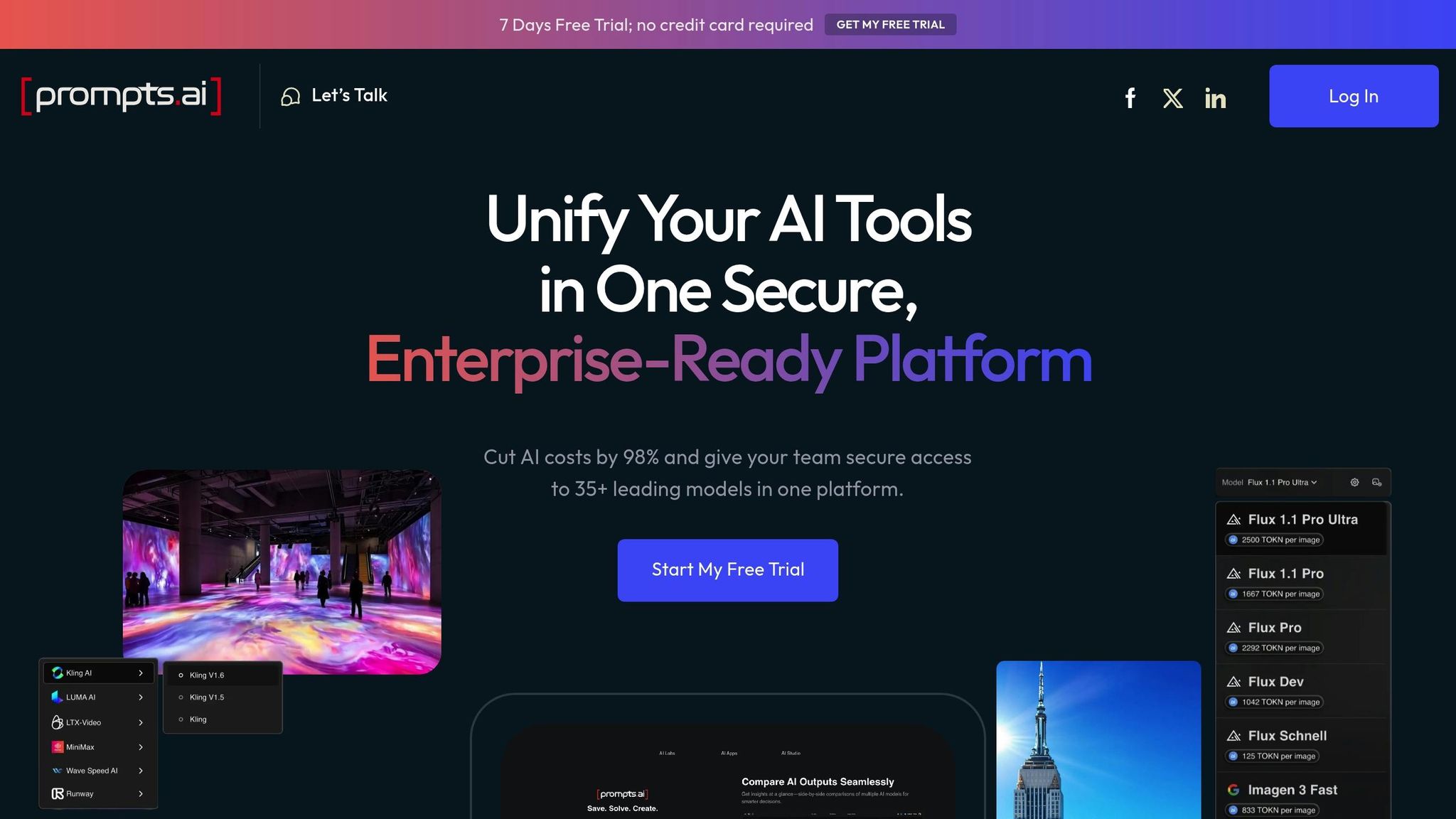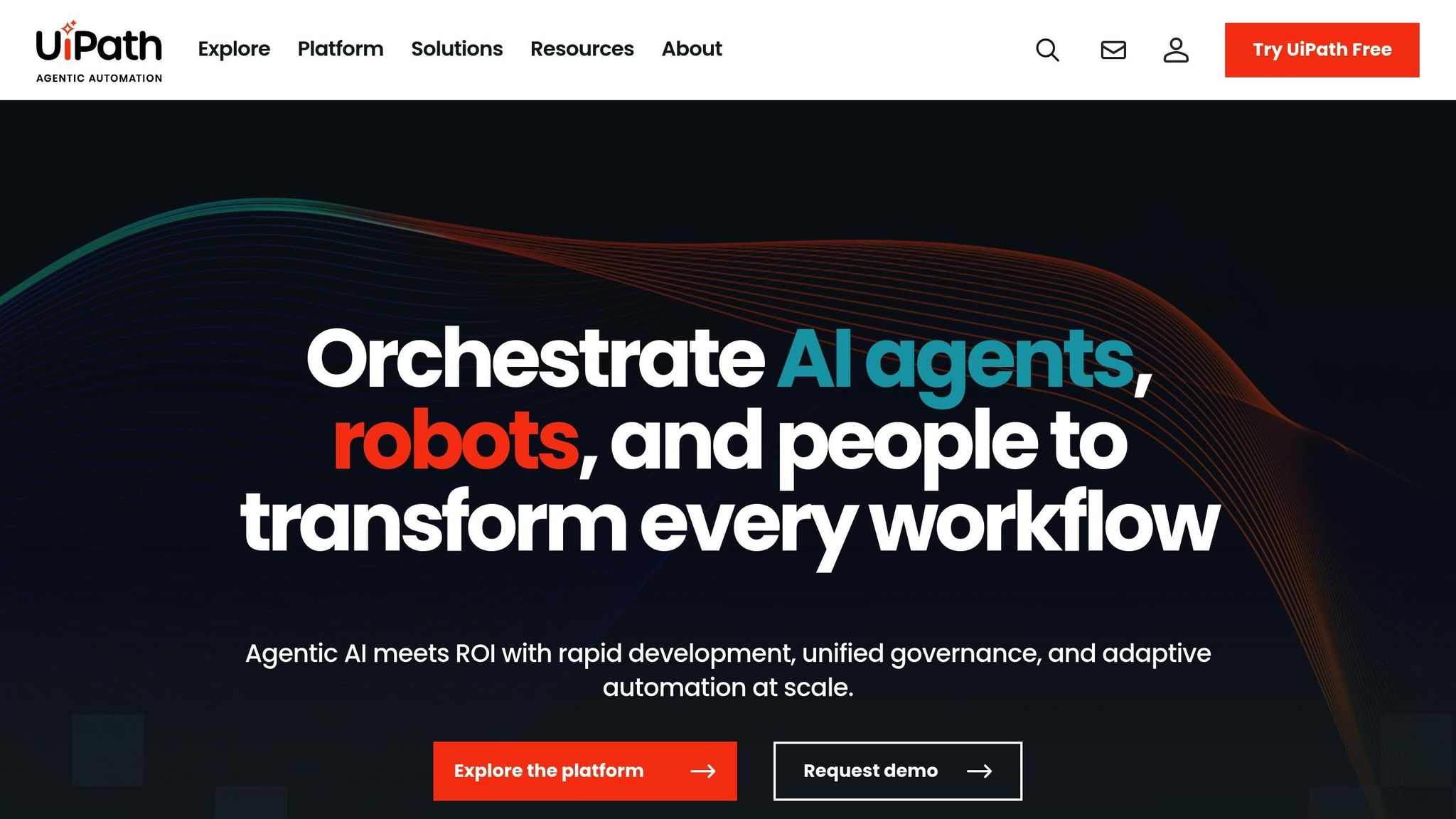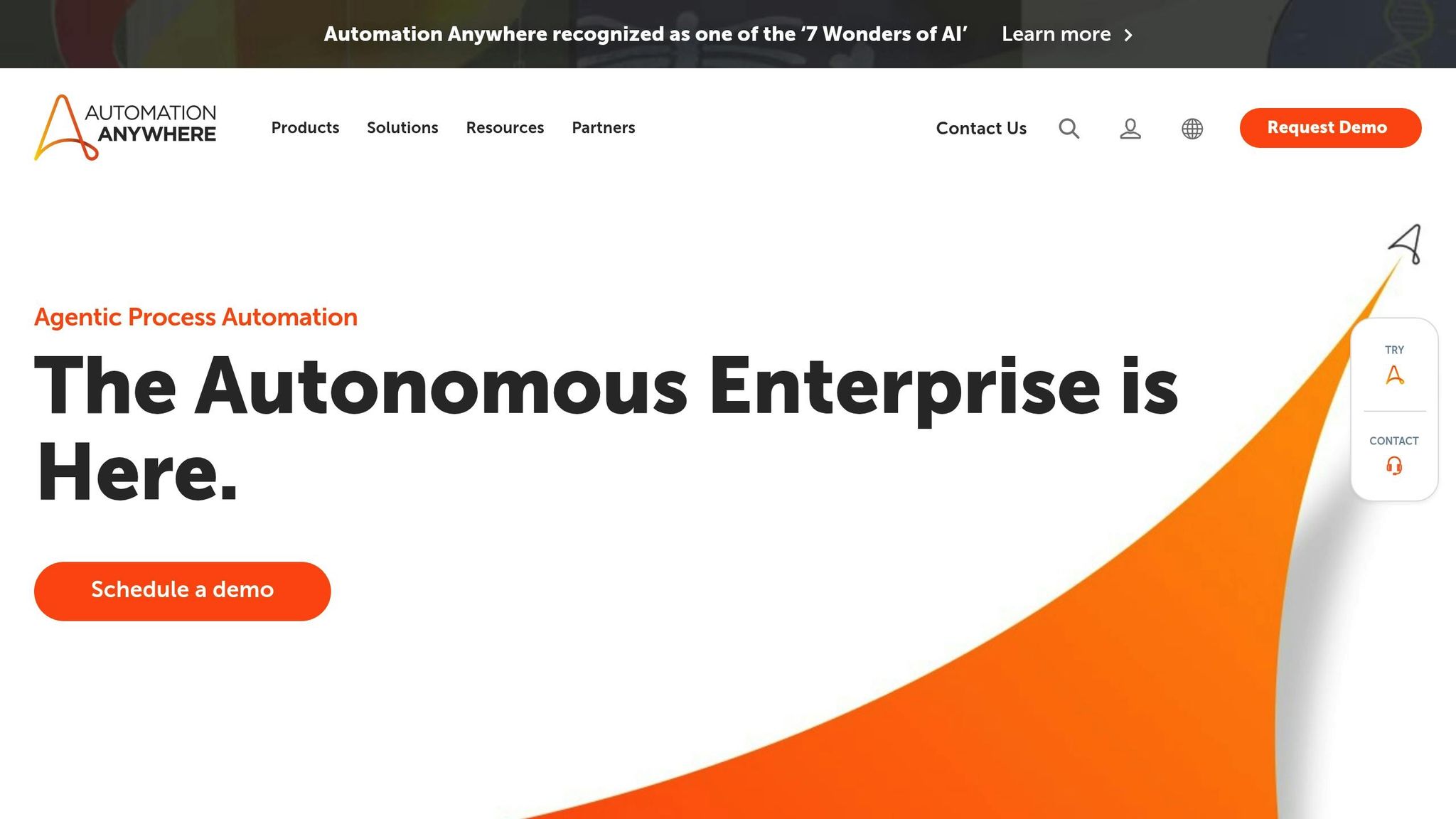
Choosing the right AI platform can save you time and money. Whether you're cutting costs, improving workflows, or managing large-scale automation, today's top platforms offer tailored solutions for every business need. Here's a quick overview:
Each platform shines in different areas - Prompts.ai for cost optimization, UiPath for broad automation, and Automation Anywhere for flexible deployment. Below, we break down their strengths, weaknesses, and use cases to help you decide.

Prompts.ai positions itself as a game-changer in AI orchestration, uniting over 35 top-tier large language models, including GPT-4, Claude, LLaMA, and Gemini, into one secure platform. By offering a centralized hub, it simplifies workflows for organizations ranging from Fortune 500 companies to creative agencies and research labs, eliminating the clutter of juggling multiple tools.
With Prompts.ai, users can consolidate various subscriptions into a single dashboard, complete with features like prompt workflows, real-time cost monitoring, and direct performance comparisons.
The platform’s unified interface makes it easy for teams to navigate between different AI models while seamlessly integrating with existing systems. This eliminates the hassle of managing multiple APIs and inconsistent interfaces, allowing organizations to focus on maximizing the capabilities of their AI tools. By simplifying these processes, Prompts.ai paves the way for streamlined operations and scalable growth.
Prompts.ai adapts effortlessly to growing needs, whether it’s adding new models, users, or teams. Its flexible pay-as-you-go TOKN credit system ensures that costs align with actual usage, making it easier for businesses to expand their AI initiatives as their automation requirements evolve.
One of Prompts.ai’s standout features is its ability to reduce AI software expenses by as much as 98%. Its transparent, token-based pricing system provides clarity around spending, while the integrated FinOps layer enables detailed cost tracking. Teams can monitor expenses by project, team, or specific use case, ensuring smarter financial decisions and avoiding budget overruns.
Designed with enterprise needs in mind, Prompts.ai prioritizes security and regulatory compliance. Features like robust audit trails and policy controls ensure that organizations maintain oversight while enjoying the flexibility needed to implement effective automation strategies.

UiPath stands out as a prominent platform in the realm of robotic process automation (RPA), streamlining repetitive business tasks with ease. By blending traditional RPA tools with artificial intelligence, it delivers automation solutions capable of handling both structured and unstructured data.
The platform simplifies routine tasks like data entry, invoice processing, customer onboarding, and report generation using a visual workflow designer that requires little to no coding expertise.
UiPath seamlessly integrates with over 500 enterprise applications, including major systems like SAP, Salesforce, Microsoft Office Suite, and Oracle. Its AI Computer Vision technology enables it to interact with virtually any application interface, even older systems without modern APIs. This makes it especially useful for organizations managing diverse and complex technology environments.
The platform’s Document Understanding feature efficiently processes a variety of document types - such as PDFs and scanned images - by extracting key data and integrating it into existing business workflows. With support for both human-assisted (attended) and fully autonomous (unattended) automations, it offers flexibility for businesses looking to scale their operations.
UiPath’s Automation Cloud is designed to support large-scale deployments across multiple locations and time zones. It can manage thousands of automation processes simultaneously, thanks to built-in load balancing and resource management tools.
Businesses can start small with pilot projects and gradually expand their automation efforts. The Center of Excellence framework provides governance tools to help organizations maintain consistency and best practices as they scale, ensuring smooth automation deployment across teams and regions. Once scalability is achieved, businesses can shift their focus to maximizing cost efficiency.
UiPath operates on a subscription-based pricing model, offering tiers that align with the complexity and volume of automation needs. Its ROI tracking tools measure the financial impact of automation, helping organizations make informed investment decisions.
The UiPath Insights dashboard provides in-depth analytics on automation performance, such as time saved, error reduction rates, and overall process efficiency. These insights allow businesses to fine-tune their automation strategies, prioritizing resources where they deliver the most value.
UiPath places a strong emphasis on security and compliance. It holds SOC 2 Type II certification and adheres to GDPR, HIPAA, and PCI DSS standards. The platform incorporates role-based access controls, encrypted data transmission, and detailed audit logging for all automation activities.
The UiPath Governance module ensures regulatory and internal compliance by enforcing policies across automated workflows. Organizations can establish approval processes for new automations and monitor compliance through centralized dashboards, providing confidence in meeting both industry and internal standards.

Automation Anywhere offers a robust solution for business process automation through its Automation 360 platform and Agentic Process Automation System. By combining traditional robotic process automation (RPA) with advanced AI capabilities, the platform effectively manages complex workflows across diverse business settings. Its design focuses on seamless orchestration across multiple systems, helping to eliminate operational silos.
The platform excels in connecting systems through APIs, pre-built connectors, and partnerships with leading iPaaS providers like Apigee, SnapLogic, and Workato. These integrations enable businesses to unify data across various applications. For instance:
For older systems lacking modern interfaces, Automation Anywhere’s RPA capabilities mimic human actions, such as clicking buttons or entering data, ensuring compatibility with both on-premise and cloud applications. These features underscore the platform’s ability to align workflows with contemporary business needs.
"In September 2017, a major telecommunications enterprise utilized Automation Anywhere's API-triggered bots. After a new customer account application was approved using cognitive technology (such as IBM Watson), a software bot automated the remaining process. This involved back-and-forth decision-making between the cognitive system and Automation Anywhere, driven by business process logic."
The Agentic Process Automation System supports deployments across leading cloud environments, including AWS, Google Cloud Platform, and Azure. Its lightweight architecture simplifies system integration and allows for quick creation of connectors. This flexibility makes it easy for organizations to start with smaller pilot projects and expand their automation initiatives over time. It bridges the gap between legacy on-premise systems and modern cloud-based applications, providing a scalable framework that supports growth while maintaining efficiency.
Automation Anywhere integrates a variety of proprietary and third-party AI models, including those from OpenAI, Google, and Anthropic, into a single interface. This unified approach speeds up deployment and reduces the time needed to achieve results. By combining automation tools with AI in one platform, it simplifies development and streamlines implementation efforts. Its flexible integration capabilities further reduce deployment complexity, making it a cost-effective choice for businesses aiming to optimize their operations.
Expanding on the detailed features of each platform, this section highlights their main strengths and limitations. Every platform has its own set of benefits and trade-offs, which businesses must carefully consider based on their operational needs and budget priorities.
Prompts.ai takes the lead with its enterprise-level AI orchestration, providing access to over 35 top language models through a single, secure interface. A standout feature is its pay-as-you-go TOKN credit system, which can reduce AI software costs by up to 98%. Additionally, it excels in offering transparency and governance, with real-time visibility into AI activities across teams and use cases. However, businesses heavily reliant on traditional robotic process automation (RPA) for legacy systems might find this platform less aligned with their needs. On the other hand, UiPath offers strong integration and automation tools but introduces different cost and licensing considerations.
UiPath provides a robust automation solution through its AI-powered Business Automation Platform, combining RPA with advanced AI capabilities. Its key strength lies in its extensive integration options and support for complex environments. Moreover, UiPath's Studio X empowers non-technical users to create automations, making it accessible for a wider audience. However, its licensing structure can be complicated, and costs may rise significantly for large-scale deployments involving multiple modules. In comparison, Automation Anywhere emphasizes hybrid deployment and API-driven integration, adding another layer of flexibility to automation.
Automation Anywhere shines with its Automation 360 platform, which supports both cloud and on-premise deployments. Its API-driven architecture allows seamless integration with modern applications while still maintaining compatibility with legacy systems through traditional RPA methods. That said, organizations new to automation may face a steep learning curve, and implementation often requires advanced technical expertise.
The following table summarizes the platforms' performance across key areas such as interoperability, scalability, cost optimization, and security:
| Platform | Interoperability | Scalability | Cost Optimization | Security and Compliance |
|---|---|---|---|---|
| Prompts.ai | ✅ | ✅ | ✅ | ✅ |
| UiPath | ✅ | ✅ | ⚠️ | ✅ |
| Automation Anywhere | ✅ | ✅ | ⚠️ | ✅ |
This comparison underscores that while all three platforms excel in interoperability and scalability, they differ significantly in cost optimization. Prompts.ai stands out with its transparent, token-based pricing model, making it a potentially cost-effective choice for organizations aiming to avoid the complexity of managing multiple AI tools. In contrast, UiPath and Automation Anywhere require more intricate license management and may involve higher upfront costs, though they provide broader automation capabilities that extend beyond language model orchestration.
When it comes to security and compliance, all platforms offer strong safeguards, including controls, audit trails, and governance frameworks. Businesses must determine whether their primary focus is on comprehensive automation - including traditional RPA - or on AI-driven process optimization centered around language model orchestration.
Selecting the right AI automation platform depends heavily on your specific goals, technical environment, and budget. Each platform caters to unique business needs, making it essential to align your choice with your operational priorities.
If cost efficiency and AI governance are at the top of your list, Prompts.ai is a strong contender. Its token-based pricing model offers substantial savings, making it an excellent choice for businesses looking to scale AI adoption without breaking the bank. The platform's ability to unify over 35 leading language models within a single interface helps reduce tool sprawl while providing enterprise-level security and real-time monitoring of AI activities.
For businesses focused on broader automation capabilities, UiPath shines with its process automation tools. Its Business Automation Platform integrates traditional RPA features, making it compatible with legacy systems. However, it's worth noting that large-scale deployments involving multiple modules can lead to higher licensing costs, so organizations should carefully assess the total cost of ownership.
If your enterprise requires flexibility in deployment, Automation Anywhere's Automation 360 platform offers both cloud and on-premise options. Its API-driven architecture is well-suited for complex technical needs and can leverage existing infrastructure investments. However, be prepared for a steeper learning curve, which might require additional training and resources.
Across all platforms, security and compliance standards are robust. The main differentiators lie in pricing models and how well each platform aligns with specific use cases. For organizations prioritizing AI-driven process optimization, Prompts.ai stands out with its straightforward pricing and streamlined approach. On the other hand, companies with broader automation goals might find UiPath or Automation Anywhere more fitting - though these options may come with higher implementation and licensing expenses.
If your focus is on AI-powered workflows and cost-effectiveness, Prompts.ai is an excellent starting point, especially for organizations new to AI automation. For businesses with established RPA needs or hybrid deployment requirements, a thorough evaluation of UiPath and Automation Anywhere is recommended to ensure they meet your specific demands.
Prompts.ai's token-based pricing model offers a smart way to manage AI expenses, letting businesses pay solely for what they use. By replacing flat-rate fees with pay-per-use credits, this system ensures you're only charged for the tokens you actually consume.
Through optimized token usage and strategic prompt design, Prompts.ai helps businesses dramatically lower their AI costs - potentially slashing expenses by up to 98%. This model allows organizations to allocate resources more wisely while maintaining strong productivity and streamlined operations.
Traditional Robotic Process Automation (RPA) is designed to handle repetitive, rule-based tasks by following predefined workflows. It's particularly effective for straightforward jobs like data entry or invoice processing. However, it struggles when faced with complex or unpredictable scenarios, as it lacks the flexibility to adapt.
On the other hand, AI-driven automation leverages machine learning and cognitive capabilities to analyze data, recognize patterns, and make informed decisions. This approach enables smarter, more adaptable automation that evolves alongside changing business needs.
Prompts.ai takes automation to the next level by integrating cutting-edge AI models to manage workflows on a larger scale. It’s built to handle intricate processes, significantly cut operational costs - by as much as 98% - and provide a streamlined, scalable solution for businesses aiming to boost productivity and optimize operations.
Prompts.ai places a strong emphasis on keeping your data secure and compliant. The platform employs end-to-end encryption to protect your information, real-time monitoring to identify and block unauthorized access, and automated compliance checks to align with industry standards. Additionally, detailed audit trails record system activities, ensuring transparency, while Secure by Design principles guarantee that safety is a fundamental part of every AI tool.
Together, these features create a trustworthy and controlled environment where businesses can automate processes without compromising sensitive data.


